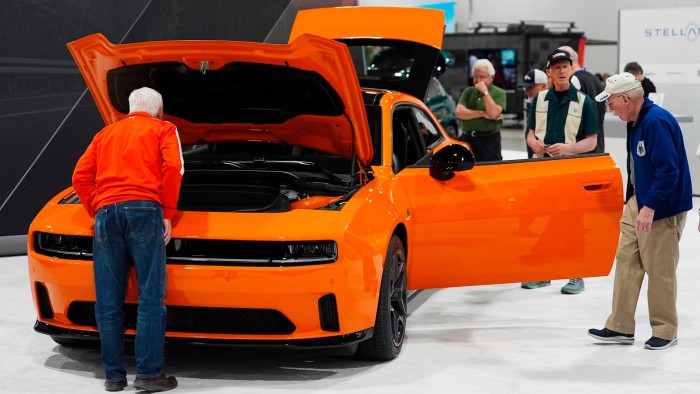Unlock the White House Watch newsletter for free
Your guide to what Trump’s second term means for Washington, business and the world
US President Donald Trump is planning to spare carmakers from some of his most onerous tariffs, in another trade war climbdown following intense lobbying by industry executives over recent weeks.
The move would exempt car parts from the tariffs that Trump is imposing on imports from China to counter fentanyl production, as well from those levied on steel and aluminium — a “destacking” of the duties, according to two people with knowledge of the matter.
The exemptions would leave in place a 25 per cent tariff Trump imposed on all imports of foreign-made cars. A separate 25 per cent levy on parts would also remain and is due to take effect from May 3.
Although Washington has already shielded autos from the “reciprocal” tariffs announced on major trading partners, US auto companies have in recent weeks pushed for further exemptions.
The concessions would mark an initial win for the auto sector and another retreat by Trump on his most aggressive tariffs amid concerns that they would push up US car prices, disrupt supply chains and cause job losses.
Car executives have stepped up their criticism of the tariffs over the past week, with Stellantis chair John Elkann warning that “American and European car industries are being put at risk” by Trump’s trade policy.
Another senior automotive executive said: “We’ve urged the administration — don’t hit us over and over with all of these other tariffs . . . because that really jeopardises the health of our sector.”
The reprieve is also the latest sign Trump is open to offering carve-outs to favoured industries after his tariff plans triggered a deep sell-off in global markets this month and warnings they could lead to a US recession.
Trump announced bespoke “reciprocal” tariffs of up to 50 per cent on almost every US trading partner on “liberation day” on April 2, before later lowering the levies to a 10 per cent baseline for 90 days.
Last week, the administration said it would exempt consumer electronics such as laptops and smartphones from the reciprocal tariffs but would instead potentially hit those imports with other levies later this year.
The president had also signalled last week that there would be “help” for the auto industry. He also earlier offered better terms for imports of cars made in Mexico and Canada as long as companies complied with the rules of the 2020 USMCA trade agreement.
Complete vehicles and parts that comply with the terms of the USMCA will have the 25 per cent tariff applied only to their non-US content.
The people with knowledge of the discussions said current negotiations are mainly focused on making it easier to implement the levies — for example, by simplifying rules over where the car components are sourced.
Trump imposed tariffs of 20 per cent on all imports from China to retaliate for the country’s role in fentanyl manufacturing. He later applied separate “reciprocal” tariffs to Chinese imports, which were ratcheted up to 125 per cent.
Auto parts are exempt from the “reciprocal” tariffs, so those from China currently face only the 20 per cent “fentanyl” levy, along with any applicable duties for steel and aluminium content, alongside a 25 per cent vehicle tariff.
The White House declined to comment.







